- November 5, 2023
- Avi Charlton
- Uncategorized
Understanding Inflammation

What is Inflammation?
Inflammation is the normal biological response of body tissue to harmful stimuli, such as pathogens, irritants, and infections. The function of inflammation is to eliminate the initial cause of cell injury, clear out dead cells and tissue damage, and initiate tissue repair.
Types of Inflammation
Acute Inflammation is a short-term insult to the body. For example, injuries, infections, and short-term stress.
Chronic Inflammation is a prolonged insult to the body. It can go on for a long time before you notice symptoms. For example, chronic infections, chemical exposures, foods, environmental toxins, stress, obesity, allergies, and autoimmune conditions.
In this article, we will concentrate on discussing chronic inflammation, what contributes to it, and what we can do to reduce the effects of chronic inflammation.
Chronic Inflammation
Chronic inflammation lasts anywhere between months and years. It’s due to the long-term exposure of the body to a toxin or an irritant. It can be very insidious onset. Symptoms can be difficult to notice. The body’s immune system is working non-stop, fighting inflammation. Symptoms can be very non-specific, including fatigue, brain fog, aches and pains, swelling, redness, and itching. Gastrointestinal symptoms can include diarrhea, constipation, abdominal bloating, and reflux. Sometimes inflammation can cause weight gain, and sometimes weight loss. Mood symptoms can also be manifestations of inflammation, including depression, anxiety, and stress.
We can measure markers in the blood, for example – C-reactive protein (CRP), Erythrocyte sedimentation rate (ESR), and ferritin.
Chronic Conditions and Chronic Inflammation
According to the Australian Bureau of Statistics (in the 2017-18 financial year), 47% of Australians have chronic conditions. Over the last decade, the prevalence of chronic conditions increased from 42%.
Chronic health conditions experienced in Australia in 2017-18 were:
- Mental and behavioural conditions – 4.8 million people (20.1%)
- Back problems – 4.0 million people (16.4%)
- Arthritis – 3.6 million people (15.0%)
- Asthma – 2.7 million people (11.2%)
- Diabetes mellitus- 1.2 million people (4.9%) comprising Type 1 Diabetes – 144,800 people (0.6%) and Type 2 Diabetes – 998,100 people (4.1%)
- Heart, stroke and vascular disease – 1.2 million people (4.8%)
- Osteoporosis – 924,000 people (3.8%)
- Chronic obstructive pulmonary disease (COPD) – 598,800 people (2.5%)
- Cancer – 432,400 people (1.8%)
- Kidney disease – 237,800 people (1.0%)
The majority of the conditions above are caused by chronic inflammation. We now understand that cardiovascular disease, cancer, and mental health conditions are all related to chronic inflammation.
Can Inflammation Cause Weight Gain?
In the section , we will answer the question ‘Can inflammation cause weight gain?’ and explore the intricate connection between inflammation and weight gain.
Studies indicate that chronic inflammation could indeed contribute to weight gain. This is largely due to the disruption of normal metabolic functions by inflammation, leading to an imbalance in energy regulation. When the body experiences chronic inflammation, it may respond by storing excess fat, particularly in the abdominal area. This response is often protective, but over time, it can result in weight gain and obesity. Therefore, inflammation can lead to weight gain and it is absolutely crucial to understand the role inflammation plays in our overall health and well-being.
Causes of Chronic Inflammation
Dietary Causes
1. Sugar

The body has a very sophisticated system of normalising blood glucose. The normal amount of blood glucose is 4gm in a 70kg person.(1) There are strict bodily processes using hormones to regulate blood glucose, including insulin and glucagon.
In many studies using animals and human, diets high in glucose leads to insulin resistance, obesity, increased gut permeability, and low-grade inflammation.(2)
Consuming excess sugar increases inflammation in blood vessels, intestinal walls, and cells and damages the collagen in the body. The body has to produce more insulin to counteract the increased glucose load in the bloodstream.
Excess glucose in the bloodstream also creates reactive oxygen species and advanced glycation end products (AGEs). This in terms leads to oxidative stress and inflammation.(3)
Sugar also increases the oxidation of LDLs to become small-dense oxidized LDLs. These smaller particles increase the risk of atherosclerosis and subsequently increase cardiovascular disease.
There’s increased evidence that excessive glucose intake increases the risk of heart disease, obesity, diabetes, cancer, liver disease, Alzheimer’s disease, and many other chronic conditions.
Non-alcoholic fatty liver disease (NAFLD) is the hepatic manifestation of metabolic syndrome. Diets high in sugar and high fructose corn syrup increase the risk of NAFLD. (4)
2. Gluten
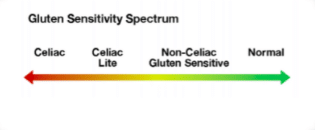
Gluten is the protein found the grains, including rye, barley, and wheat. Oats also have a protein called avenin, which can cause a reaction in people with or without coeliac disease.
We all know the effect of gluten on individuals with coeliac disease. These people are allergic to gluten. Their body will react to even the smallest amount of gluten in the diet.
There’s increasing evidence of a condition called Non-Guten Coeliac Sensitivity. These individuals do not have the genes typical of people with coeliac disease. However, they may exhibit symptoms similar to those with coeliac disease – including irritable bowel symptoms, fatigue, headache, joint and muscle pains, brain fog, rash, anaemic, mental health symptoms. These people experience symptoms following ingestion of gluten, improving with these symptoms after gluten withrawal and relapsed after reintroduction of gluten. (5)
There’s also evidence that gluten increases intestinal permeability in all individuals, i.e. increases leaky gut, regardless if they have coeliac disease or not.(6)
3. Processed foods
Ultra-processed foods are industrially manufactured ready-to-eat or ready-to-heat formulations containing food additives and little or no whole foods. Consumptions of ultra-processed foods have increased risks of cardiovascular disease through mechanisms of changing the gut microbiome, increased inflammation, oxidative stress, increase blood glucose, increased insulin resistance, and hypertension.
These foods, not only include, so-called junk foods, such as chips, crisps, and snacks, but also include foods that are marketed as healthy, such as cereals, flavored yogurts, low-fat products, and products “enriched” with nutrients.(7)
High consumption of processed foods increases abdominal obesity, which is a marker of metabolic syndrome. These fat cells also release inflammatory mediators (adipokines), which further increases inflammation. (8) The fat in the abdomen is actually an endocrine organ, further increasing inflammation in the body.
Processed foods often contain trans-fatty acids from partially hydrogenized vegetable oils. Trans-fatty acids are induces intestinal inflammation and insulin resistance, which we will discuss in the following section.
4. Trans-fat
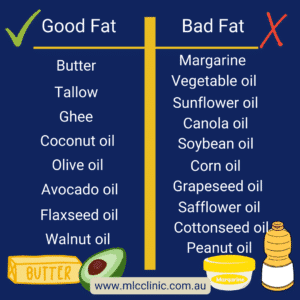
There are many nutritional and epidemiological studies showing that high consumption of trans-fatty acids can cause adverse of human health, including increased risk of heart disease, diabetes, and cancer. These studies show trans-fat increases intestinal inflammation, damages vascular wall, and affect cell membrane function.(9, 10) Trans-fats include seed oils such as vegetable oil, canola oil, sunflower oil, peanut oil, and margarine. These oils are often found in processed foods take-aways, salad dressings, potato chips, snacks, protein bars, and ready-made sauces.
Learn more about the impact Trans Fats can have on your health
Lifestyle Causes
1. Stress
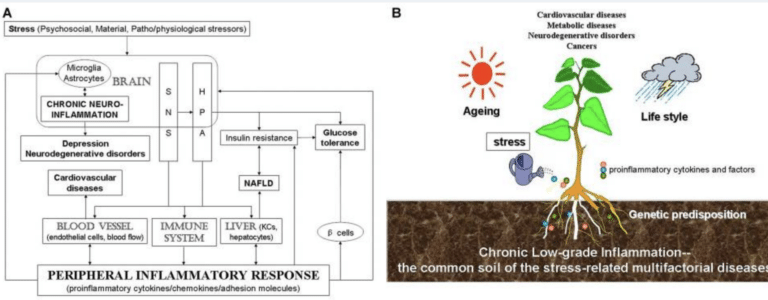
Chronic stress can increase the risk of cardiovascular disease, non-alcoholic fatty liver disease (NAFLD), metabolic conditions, neurodegenerative diseases and depression, and cancer.
There’s evidence showing stress can activate inflammatory response in the brain and the periphery by activating the hypothalamus-pituitary-adrenal axis (HPA axis) and hence suppressing immune response by releasing stress hormones such as cortisol.(11)
There is also growing evidence that Adverse Childhood Events (ACEs), such as exposure to family violence, and child maltreatment, can have significant adverse effects on health outcomes. These individuals have a high risk of obesity, diabetes, substance abuse, heart disease, cancer, mental health conditions, etc.(12)
2. Poor sleep
There are studies showing with deprivation of sleep in humans, inflammatory mediators are increased. There’s increasing evidence that insufficient sleep leads to obesity, increases the risk of cardiovascular disease, and all-cause mortality. This could be caused by increased release in inflammatory mediators causing blood vessel changes and increased blood pressure, sympathetic drive, and even increased clotting in blood vessels and hence increased inflammation and cardiovascular risk.(13)
Sleep deprivation also affects glucose metabolism by slowing it down, hence increasing the risk of insulin resistance, metabolic syndrome, and diabetes.
Click here to learn about the link between Lack of Sleep and Weight Loss
3. Chronic infections
Post-acute covid symptoms are defined as symptoms lasting more than 4 weeks after covid infection. These symptoms can include, fatigue, muscular weakness, joint pains, shortness of breath, cough, headaches, depression, anxiety, palpitations, chest pains, and increased clots.
Mechanisms can be caused by direct viral toxicity, vascular damage, immune system dysregulation, stimulation of increased inflammation, and increased clotting.(14)
Other infections that can increase the risk of chronic inflammation include HIV, hepatitis B, C, herpes, and cytomegalovirus (CMV).
Chronic intestinal infections include helicobacter infection, small bowel intestinal overgrowth, intestinal parasites, and overgrown intestinal candida. These chronic infections increase intestinal permeability, i.e. leaky gut. They can increase risks of autoimmune conditions, reduced immunity and other chronic inflammatory conditions such as gastrooesophageal disease, irritble bowel symdrome, cancer, and chronic fatigue syndrome.
4. Environmental irritants

These can be chemical, biological or physical. For example:
- Chemical irritants – pollutants, toxic wastes, plastics heavy metals, pesticides, make up, moisturisers, shampoo, hair dyes, nail polishes, fragrances, deodorants, shower gels, sunscreen, toothpaste, food wraps
- Biological irritants – mould, insect, animal allergens
- Physical irritants – electromagnetic fields, microwave, UV radiation, mobile phones
Conditions Associated with Increased Inflammation
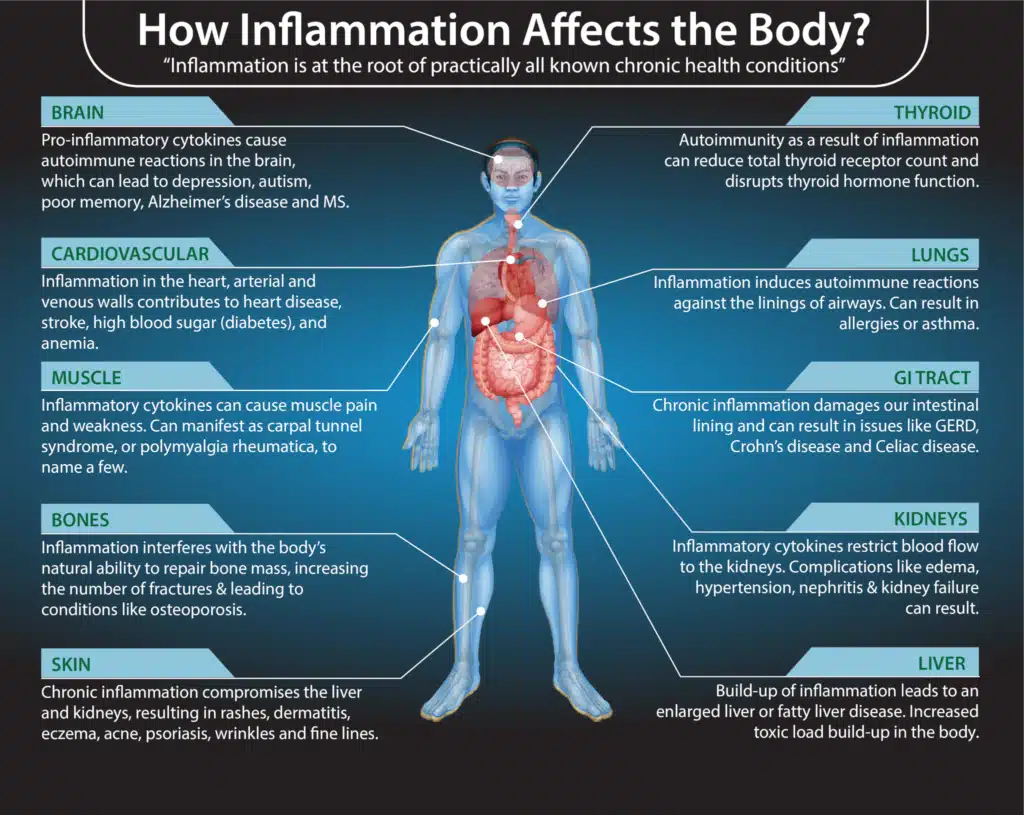
- Metabolic syndrome
- Type 2 diabetes
- Alcoholic liver disease
- Non alcoholic liver disease/ fatty liver
- Alzheimer’s disease
- Cardiovascular disease
- Congestive heart failure
- Chronic fatigue syndrome
- Depression/ anxiety
- Obesity
- Arthritis and joint disease
- Allergies
- Chronic obstructivce airways disease
- Cancer
- Asthma
- Osteoporosis
Ways to Reduce Inflammation
- Avoid inflammatory foods
- Increase anti-inflammatory foods
- Exercise regularly
- Prioritise sleep
- Reduce stress
- Fasting
- Vitamin D
- Breathing exercises
- Yoga/ stretching/ mindfulness
- Cold showers/ baths
- Sunlight
- Nature
- UV sauna
- Pets
- Reduce artificial lighting
Anti-inflammatory foods
- Meat/ chicken/ pork/ lamb (esp grass-fed)
- Fish (esp wild-caught)
- Vegetables
- Polyphenols – e.g. berries
- Nuts
- Dark chocolate
- Green tea
- Curcumin
- Apple cider vinegar
- Ginger and garlic
- Coffee
- EPA and DHA
- Avocado
- Olive oil
- Micronutrients – magnesium, Vit D, Vit D, selenium, glutathione
- Probiotics/ prebiotics
- Bone broth
Exercise
There is no doubt exercise is benefit for health. What if you can measure the benefits of exercise on inflammatory markers? Studies are showing participants who engage in light, moderate and vigorous physical activities all improved in their C-reactive protein (CRP). (15, 16) CRP is a protein made by the liver indicating the level of inflammation in the body.
Vitamin D
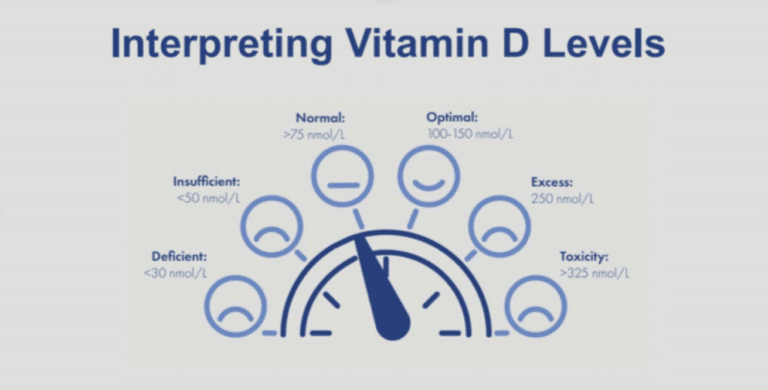
Vitamin D is not just important for bone health. There’s growing evidence that vitamin D plays an important role in regulating inflammation and the immune system. Many studies are showing lower vitamin D is associated with unfavourable outcome in acute infections. Moreover, chronic inflammatory diseases, such as atherosclerosis-related cardiovascular disease, asthma, inflammatory bowel disease, chronic kidney disease, nonalcoholic fatty liver disease, and others, tend to have lower vitamin D status.(17) Some might even suggest that Vitamin D is actually a maker of metabolic health (18).
Fasting
There are many benefits of fasting. Fasting can optimise energy metabolism by improving mitochondrial health. It reduces oxidative damage. In rodents intermittent or periodic fasting protects against diabetes, cancers, heart disease and neurodegeneration, while in humans it helps reduce obesity, hypertension, asthma and rheumatoid arthritis.(19) Many people know fasting induces Autophagy. Autophagy is the body’s way of cleaning out damaged cells, in order to regenerate newer, healthier cells.
Fasting also offers benefits to gut health. Fasting can help to benefit the balance of bacteria in the gut.(20)
Conclusion | Can Inflammation Cause Weight Gain
Chronic inflammation is unhealthy and linked to many chronic diseases. Understanding inflammation is an important way to improve our health. In the modern lifestyle, there are many things that contribute to inflammation. We can control a lot of aspects to reduce our inflammatory load. However, there are many things that are inevitable and unavoidable that increases inflammation.
To balance out these inflammation, we can also improve our lifestyle by paying attention to things such as optimising sleep, eating well, increasing physical activity and reducing stress.
Find out how you can lose weight with Keto/Low Carb/Atkins Diet
Disclaimer
This article does not provide treatment or individual medical advice. Please see your own medical practitioner about change in lifestyle.
I am Dr Avi Charlton.
I have a special interest in nutrition and lifestyle medicine.
You can contact me at
Referrences
- https://www.ncbi.nlm.nih.gov/pmc/articles/PMC2636990/
- https://pubmed.ncbi.nlm.nih.gov/21807932/
- https://pubmed.ncbi.nlm.nih.gov/7918300/
- https://pubmed.ncbi.nlm.nih.gov/29408694/
- https://www.ncbi.nlm.nih.gov/pmc/articles/PMC4406911/
- https://www.ncbi.nlm.nih.gov/pmc/articles/PMC4377866/
- https://www.ncbi.nlm.nih.gov/pmc/articles/PMC8483964/
- https://www.ncbi.nlm.nih.gov/pmc/articles/PMC4970637/
- https://www.frontiersin.org/articles/10.3389/fimmu.2021.669672/full
- https://pubmed.ncbi.nlm.nih.gov/16713393/
- https://www.ncbi.nlm.nih.gov/pmc/articles/PMC5476783/
- https://www.thelancet.com/journals/lanpub/article/PIIS2468-2667(17)30118-4/fulltext
- https://www.ncbi.nlm.nih.gov/pmc/articles/PMC3548567/
- https://www.ncbi.nlm.nih.gov/pmc/articles/PMC8893149/
- https://pubmed.ncbi.nlm.nih.gov/12192226/
- https://www.cmaj.ca/content/172/9/1199
- https://www.ncbi.nlm.nih.gov/pmc/articles/PMC4070857/
- https://www.ncbi.nlm.nih.gov/pmc/articles/PMC3713625/
- https://www.ncbi.nlm.nih.gov/pmc/articles/PMC3946160/
- https://link.springer.com/article/10.1007/s10123-022-00272-7#citeas
- https://www.everlywell.com/blog/weight-management/does-inflammation-cause-weight-gain/
- https://www.ameliaphillips.com.au/weight-loss/inflammation-weight-gain/
- https://www.buoyhealth.com/weight-management/inflammation-and-weight-gain
- https://www.eatingwell.com/article/7901433/surprising-link-between-chronic-inflammation-obesity/
- https://www.eatingwell.com/article/2058068/inflammation-might-be-the-reason-youre-not-losing-weight-here-are-5-things-you-can-do-about-it/


